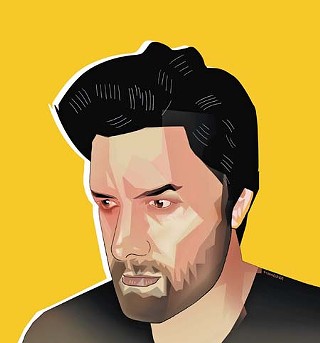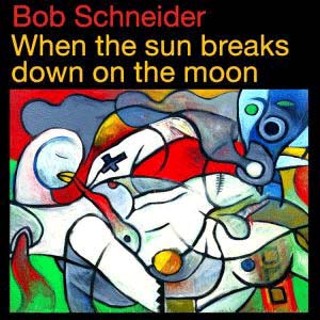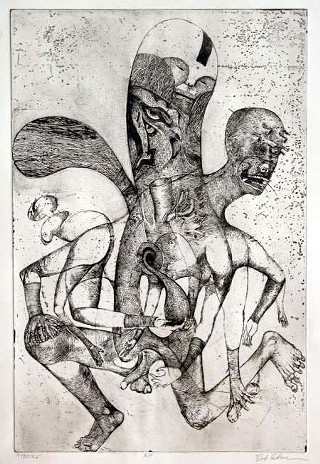What About Bob?
Bob Schneider's affirmation
By Margaret Moser, Fri., Oct. 2, 2009

Mondays at the Saxon Pub, Matt the Electrician plugs into the second-best gig in town. His clever songs entertain the gathering crowd, and each receives more applause than the previous as the room fills.
"We are, of course, Megadeth," he quips amid much laughter.
At the end of his set, which includes a song dedicated to the recently deceased Jim Carroll, Matt the Electrician closes to a packed house delivering a roar of approval most artists aspire to and few achieve. Such is the benefit of opening for the guy with the best gig in town, Bob Schneider.
As his band, Lonelyland, tunes up, Schneider seats himself between bassist Harmoni Kelley and guitarist Jeff Plankenhorn. Conrad Choucroun skitters across the drum head with his sticks as Danny Levin runs the bow across a cello and Oliver Steck squeezes the accordion. That he doesn't stand in front of the band at the microphone reveals a lot about the way Schneider regards the music he makes and his team of musicians.
It also says something about the way he regards his audience. At 44, he sits eye to eye with both his band and his fans – in intimate settings. As the hottest club ticket in town, sporting new powerhouse CD Lovely Creatures and a couple of post-40 wake-up calls, Schneider unsurprisingly – and perhaps begrudgingly – has morphed into the most popular singer-songwriter in Austin.
'The Hulk'
"I was 5 feet, 4 inches in my senior year, a total nerd. Nobody knew who I was."
Schneider sits, long fingers laced and hands folded on the dark-green picnic table, outside Casa de Luz on a breezy Tuesday. As he traces his earliest musical experiences, his even features are pleasing, his dark brown hair combed casually back, the indigo blue of his shirt matching his voice as he recalls the muse first tapping his shoulder.
"I was with a band called Bitter Lemon, and we played the high school talent show and killed. All of a sudden it's: 'Hey! I'm the guy from the talent show!' Same thing in college. I did a show where I recruited a couple of friends, and we were Bobby Blue & the Basstones. I think I even got laid.
"It was so much better than doing art!
"While I was going to school, I heard about Austin. So I thought: 'I can go there, and if it works out, it works out. If not, I can always go back to art.'"
Austin worked out for Schneider. So did the art (see the cover of this Chronicle), yet that was never the main attraction. Few musicians in Austin can boast the longevity and local history Schneider does. After moving here from El Paso in 1988, he plunged into the local scene with a performance at the University of Texas, "one of those gigs where everything went wrong."
Joe Rockhead went right, a funky outfit that borrowed heavily from the Red Hot Chili Peppers and gorged Schneider's developing frontman persona. Rockhead's sound leapfrogged over reigning Austin favorites Retarted Elf and Bad Mutha Goose into one of the few bands holding its own in the early 1990s against the mighty Soulhat and Little Sister on Sixth Street's Steamboat/Black Cat axis. Schneider's charismatic cool quickly gave way to his inner tent-show preacher, whipping him into a stomping dervish onstage with songs like "No Going Back" and "Dubronic."
When Joe Rockhead ceased, the Ugly Americans sprang up in its place like a Hydra's head. The college crowd from Rockhead followed Schneider's new band to Antone's Guadalupe Street location. For five years, the Ugly Americans funked as hard as Rockhead but with a thicker jam factor, touring with the Horde festival caravan and Dave Matthews Band. That's also the period when Boozy Bob took his last bottle down and passed it around prior to the Uglies disbanding in 1998.
"People despised me, because I was drunk," acknowledges the singer. "And I didn't want all these people to hate me. That was the real reason – I didn't want to be hated. It defined me. I was at the end of my rope, too. I wasn't suicidal, but suicide was there. It was an option. I felt like, 'If I can't keep going on, I can kill myself,' so the light at the end of the tunnel was killing myself. At some point I realized that's not such a great place to be, where suicide is your best option. The combination of being hated and being scared to death did it.
"I went to rehab. My management put me in rehab 14 years ago.
"Except for that month I was in rehab, I never missed a step. I was playing the week I got out with the Ugly Americans. As soon as I stopped drinking, I got really productive. I started writing songs in earnest.
"The thing I love more than anything is to make stuff, to make songs. It's wonderful. The world and people and all that are scary, and I don't know how to deal with that. I'm socially inept, and I'm pretty much always uncomfortable. But when I'm alone and making music, I feel very comfortable, very safe. I get a lot of joy from that and from performing the music in front of people. That's what makes me run."
'Robots Don't Eat Candy'
Playing to crowds makes Bob tick, something he discovered hamming it up for his parents' friends in his (and Iggy Pop's adopted) hometown of Ypsilanti, Mich., as well as in Germany, where he attended high school. His parents – opera singers both – provided early musical training and artistic encouragement. He developed a hip, entirely idiosyncratic graphic style that likewise distinguished his bands' posters and CDs.
Schneider's post-Uglies project was something considerably more offensive than his proclivity for the F-word. Not since the mid- 1980s when Dino Lee & the White Trash Revue paraded onstage with 6-foot penises and near-naked women had Austin seen anything as irresistibly obscene as the Scabs. They were sartorial, soulful, sexist, and sexy. The success and appeal of Schneider's new act lay in the combination of its charismatic frontman, horn-laden powerhouse band, and danceably dirty songs.
"Every band I started, I'd go down to the Drag every week and hand out stickers. Whoever was walking down the street: 'Hey, here's a Scabs sticker.' 'Here's a Joe Rockhead, an Ugly Americans sticker.'
"And it's weird how it works. Even though it's just a sticker, people are like, 'Yeah, I'll check 'em out.' It's personal."
With the Scabs, Schneider revealed himself not just as frontman but as a showman and bandleader. The combination suited him as smartly as the black suits and ties worn by the band, a Reservoir Dogs-hit-the-titty-bar look. The girls lost it, while the rest of the collegiate and post-college crowd had no problem staying out late for the Scabs' legendary Tuesday night gigs at Antone's.
"The crowd is real energy," stresses Schneider. "You feed off it. It's truly intoxicating, a drug. I was so self-loathing that I needed it, the affirmation. I needed that to save me because I felt so worthless before I got sober, but even afterward, too.
"I need [that crowd response] now. I'd like to say I don't, and I think I need it less now, but I still really crave it. The idea of not playing is horrifying, so I know I still want it, that I want to be reaffirmed that I'm doing something people want. The difference is, I don't need it the way I once did."
'Monster Truck'
Seems pointless to ask B.S. about S.B. – Sandra Bullock, his girlfriend of a decade ago. It paralleled the Lyle Lovett-Julia Roberts romance, where a dashing Texas musician steals the heart of an A-list Hollywood sweetheart, only Bullock married someone else and so did Schneider. Nevertheless, it gave his womanizer reputation of the 1990s priceless cachet. It also, some theorized, prepared his then-tender career for the limelight.
Lonelyland, his first solo album, entered 2000 to respectable reviews, though a few echoed the Chronicle: "Lonelyland, Schneider's debut as a singer-songwriter type, is one more reason to coo over him ... because on it he proves himself to be more than a capable writer without having to rely on rhyming monosyllabic dirty words." In other words, don't hate Bob because he's beautiful.

I'm Good Now three years later did even better, following up on the success of Lonelyland's "Round and Round," which landed on the Gun Shy soundtrack, and "Bullets," appearing in Jay and Silent Bob Strike Back. A prodigious catalog plus contract leeway gave Schneider the chance to release side projects such as the Galaxy Kings, which was released on Vanguard when The Californian came out in 2006 on Shockorama, as did Greatest Hits Live that same year. Other efforts and collaborations stack his shelf of titles: When the Sun Breaks Down on the Moon, Live at the Cactus Cafe, I Have Seen the End of the World and It Looks Like This, Songs Sung and Played on Guitar at the Same Time, Underneath the Onion Trees.
Neither high-profile breakups nor a recent divorce weight his music with maudlin content. Gut-spilling has never been Schneider's style, and on Lovely Creatures, his songs reveal a more thoughtful reflection on life.
"I put on different hats because I don't really write autobiographically," he reasons. "I try to do more like what Randy Newman does, where he's a persona and plays it out. I got the chance to go through divorce and also having a son, and these were completely opposite things.
"My son and I have written songs together, like 'The Hulk,' but I changed that one to make it a little more adult. We've got 'Monster Truck,' 'Here Comes the Vacuum Cleaner,' and 'Robots Don't Eat Candy.' We're working on more.
"Anything he wants to do, it's great. Go into music? I'd love it."
No question Schneider's son has lent his father's music a whimsy that comes from seeing the world with fresh eyes. "You're the color in the colored part of The Wizard of Oz," sings dad gleefully on "40 Dogs (Like Romeo and Juliet)."
"The relationship I have with my son is the greatest joy in my life. The dissolving of my marriage and subsequent divorce were the worst things. They happened at the same time, and I wrote a lot of songs then. There's an overriding theme to the record in that it's about relationships, but they're all love songs."
The one place that rarely sings the singer's praises is the local press. His fans vote him top honors at the Austin Music Awards repeatedly, but maybe it just looks too easy for him. He's Bob Popular, likable, good-looking, the guy your girlfriend's gaze will linger on too long, yet his music is as affable as he is.
"Never have I been a critic's darling. Yeah, I want everybody to see how I put a lot of work into what I do. I'm very much a perfectionist, and I try to get the songs to a point where they're really right. ... I spent so much time doing it and I created so much stuff, that yeah, I want people to acknowledge it."
'Here Comes the Vacuum Cleaner'

Schneider has a new CD to promote, an unenviable position even with a stellar release such as Lonely Creatures. He's not stingy about his music – his discs are available all over town, and he plays Antone's and the Saxon Pub regularly, plus he bows the Scabs at the Austin City Limits Music Festival this weekend. You can even buy live shows from www.bobschneidermusic.com/frunk.
"If 1,500 records come out in a week, 1,400 are going to be shitty, and that's what sets this one apart," he states. "[Lovely Creatures] is definitely not shitty, but everybody has their own idea of what they like.
"That's the weird thing about art – it's so personal. There are musicians and artists I think are amazing – I just never listen to their music. I never listen to Bruce Springsteen. His music doesn't resonate with me. I am amazed at how good he is. I can see how good he is. I can watch him work and go, 'This guy is as good as anyone who's done music, and he's a great songwriter,' but I won't listen to Bruce Springsteen because that music is too earnest for me."
A measure of earnestness exists in Bob Schneider's music, too. "It's not the end of everything; it's just the end of everything you know," he offers without sentimentality in "Bicycle vs. Car," the final cut on Lovely Creatures. You believe him when he repeats the words over and over because he believes it.
"When I was young, I had this idea that if I got successful, that would change my life and everything would be great. Not only have I given up on the idea that that's going to happen to me in a huge way, I've also given up the idea that if it happened, it would matter. It wouldn't change my life. It wouldn't make it any better.
"My son, that's what makes it better," he says earnestly. "That's what matters. To write music and make art."
The Scabs headline the Austin Ventures stage at the Austin City Limits Music Festival on Saturday, Oct. 3, 7:15-8pm.
Best of Bob's Austin Music Awards
Joe Rockhead, No. 5 Band of the Year, 1992-93
Ugly Americans, Best New Band, 1993-94
Musician of the Year, Best Songwriter, Best Male Vocals, Band of the Year (the Scabs), 1999-2000
Musician of the Year, Best Male Vocals, Best Songwriter, Best Singer-Songwriter, Album of the Year (Lonelyland), Best Cover Art (Lonelyland), 2000-01
Best Singer-Songwriter, 2001-02
Musician of the Year, 2003-04
Album of the Year (I'm Good Now), Song of the Year ("Cap'n Kirk"), 2004-05
Band of the Year, Best Male Vocals, Best Bluegrass, 2008-09
The Importance of Being Bob
Bob. The name bursts from the mouth, parts the lips in a breath, escapes with a monosyllabic pop. But what, I wrote in an e-mail to Bob Schneider, does it mean to share a name with characters ranging from Dylan to a cartoon sponge?
"I grew up as Bobby and then went to Bob when I moved out of the house. Never really thought about it much until I started playing music. I've never been too fond of the name. Don't really think of it as a rock & roll name, even though there are some rock & rollers with the name, including, of course, the great Bob Dylan. I was always thinking of changing it, but just never did, and I'm still not sure that keeping the name was the right idea. Even Dylan changed his last name at least. The Schneider part is the part that really is not so rock & roll ... and it's not even like there's only one Schneider, because there's old John Schneider, who had a brief career. To make a long paragraph longer, I've never been that crazy about my name, but never changed it, for kind of the same reason I don't wear hats anymore. I don't want it to look like I'm trying too hard."









